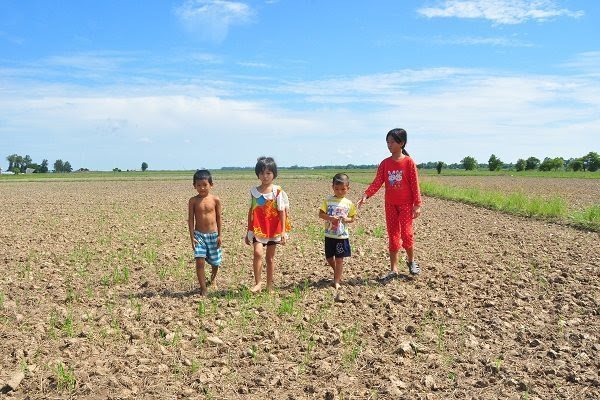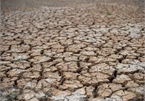 |
| Children go walking in a paddy field in the Mekong Delta province of An Giang, which faces a drought in the dry season of 2018 |
Water flow from the upstream Mekong River into the Tonle Sap Lake in Cambodia will be low in the 2019-2010 period, reducing the water flow into the Mekong Delta region.
Tang Duc Thang, deputy director of the Southern Irrigation Science Research Institute, was speaking at a workshop on plans and solutions for the 2019-2020 winter-spring crop in some provinces and cities in the southeastern region and the Mekong Delta in Tien Giang Province on October 11.
He noted that meanwhile, this year, rain is forecast to finish in November, so rainfall is likely to reach the average level of previous years.
As such, the salinity level in the dry season of the 2019-2020 period will be higher than levels seen in previous years and at an earlier date but may be less dangerous than the salinity level recorded in the 2015-2016 period, Thang said.
In December, saltwater will intrude from estuaries across 20-30 kilometers of the mainland, Thang stated, adding that in early 2020, saltwater with an average salt content of four grams per liter will reach 40-67 kilometers inland, 10-15 kilometers higher than in previous years.
However, the high salinity is expected to reach six to 27 kilometers less than in the dry season of the 2015-2016 period, he stressed.
Also, a report by the General Irrigation Department, under the Ministry of Agriculture and Rural Development, indicated that salinity intrusion will occur early in the dry season in the 2019-2020 period.
This intrusion level, despite being higher than the average levels seen in previous years, is forecast to be lower than the worst level recorded in the 2015-2016 period due to higher upstream rainfall, according to the report.
However, Nguyen Huu Thien, an independent ecological researcher, told the Saigon Times in mid-September that if rainfall did not increase for the rest of the year, this year’s salinity level would be higher than the level of 2016.
It is necessary to inform farmers of this possible high salinity intrusion so that they can avoid early seed sowing and minimize losses, he remarked. SGT
Trung Chanh

Mekong Delta to face earlier, more severe salinity, droughts
Salinity and droughts will come earlier and be more severe than in the 2018-2019 dry season in the Mekong Delta, according to Hoang Phuc Lam, Vice Director of the National Centre for Hydro-Meteorological Forecasting.

Salinity intrusion leads to water shortages in Da Nang
Da Nang Water Supply Company (Dawaco) announced that water sources have become eight times saltier so they will have to cut supplied freshwater.
 While some experts have issued a warning against high salinity in the dry season in the 2019-2020 period, a representative of the agriculture sector has remained optimistic.
While some experts have issued a warning against high salinity in the dry season in the 2019-2020 period, a representative of the agriculture sector has remained optimistic.